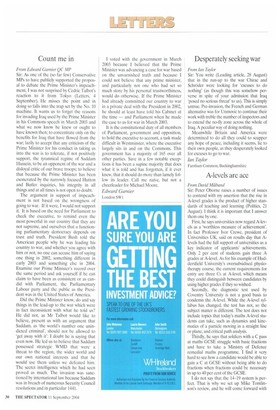Count me in
From Edward Gamier QC MP
Sir: As one of the (so far few) Conservative MPs to have publicly supported the proposal to debate the Prime Minister's impeachment, I was not surprised by Cedric Talbot's reaction to it from Tokyo (Letters, 4 September). He misses the point and in doing so falls into the trap set by the No. 10 machine. It wants us to forget the reasons for invading Iraq used by the Prime Minister in his Commons speech in March 2003 and what we now know he knew or ought to have known then; to concentrate only on the benefits for Iraq that have flowed from the war; lazily to accept that any criticism of the Prime Minister for his conduct in taking us into the war is to tolerate, if not positively support, the tyrannical regime of Saddam Hussein, to be an opponent of the war and a disloyal critic of our brave troops; to believe that because the Prime Minister has been exonerated by the narrowly focused Hutton and Butler inquiries, his integrity in all things and at all times is not open to doubt.
The argument in support of impeachment is not based on the wrongness of going to war. If it were, I would not support it. It is based on the need for Parliament to check the executive, to remind even the most powerful in our country that they are not supreme, and ourselves that a functioning parliamentary democracy depends on trust and truth. President Bush told the American people why he was leading his country to war, and whether you agree with him or not, no one can accuse him of saying one thing in 2002, something different in early 2003 and something else in 2004. Examine our Prime Minister's record over the same period and ask yourself if he can claim to have been as consistent or as candid with Parliament, the Parliamentary Labour party and the public as the President was in the United States of America.
Did the Prime Minister know, do and say things in the lead-up to the war which were in fact inconsistent with what he told us? He did not, as Mr Talbot would like to believe, present us with an argument that Saddam, as 'the world's number one unindieted criminal', should not be allowed to 'get away with it'. I doubt he is saying that even now. He led us to believe that Saddam possessed strategic WMD that were a threat to the region, the wider world and our own national interests and that he would use them unless we defeated him. The secret intelligence which he had seen proved as much. The invasion was sanctioned by international law because Saddam was in breach of numerous Security Council resolutions and in particular 1441. I voted with the government in March 2003 because I believed that the Prime Minister was advancing a case for war based on the unvarnished truth and because I could not believe that any prime minister, and particularly not one who had set so much store by his personal trustworthiness, would do otherwise, If the Prime Minister had already committed our country to war in a private deal with the President in 2002, he should at least have told his Cabinet at the time — and Parliament when he made the case to us for war in March 2003.
It is the constitutional duty of all members of Parliament, government and opposition, to hold the executive to account, a task made difficult in Westminster, where the executive largely sits in and on the Commons. This government has a majority of 165 over all other parties. Save in a few notable exceptions it has been a supine majority that does what it is told and has forgotten, if it ever knew, that it should do more than lamely follow its leader. Call me naive, but not a cheerleader for Michael Moore.
Edward Gander
London SW1










































































 Previous page
Previous page